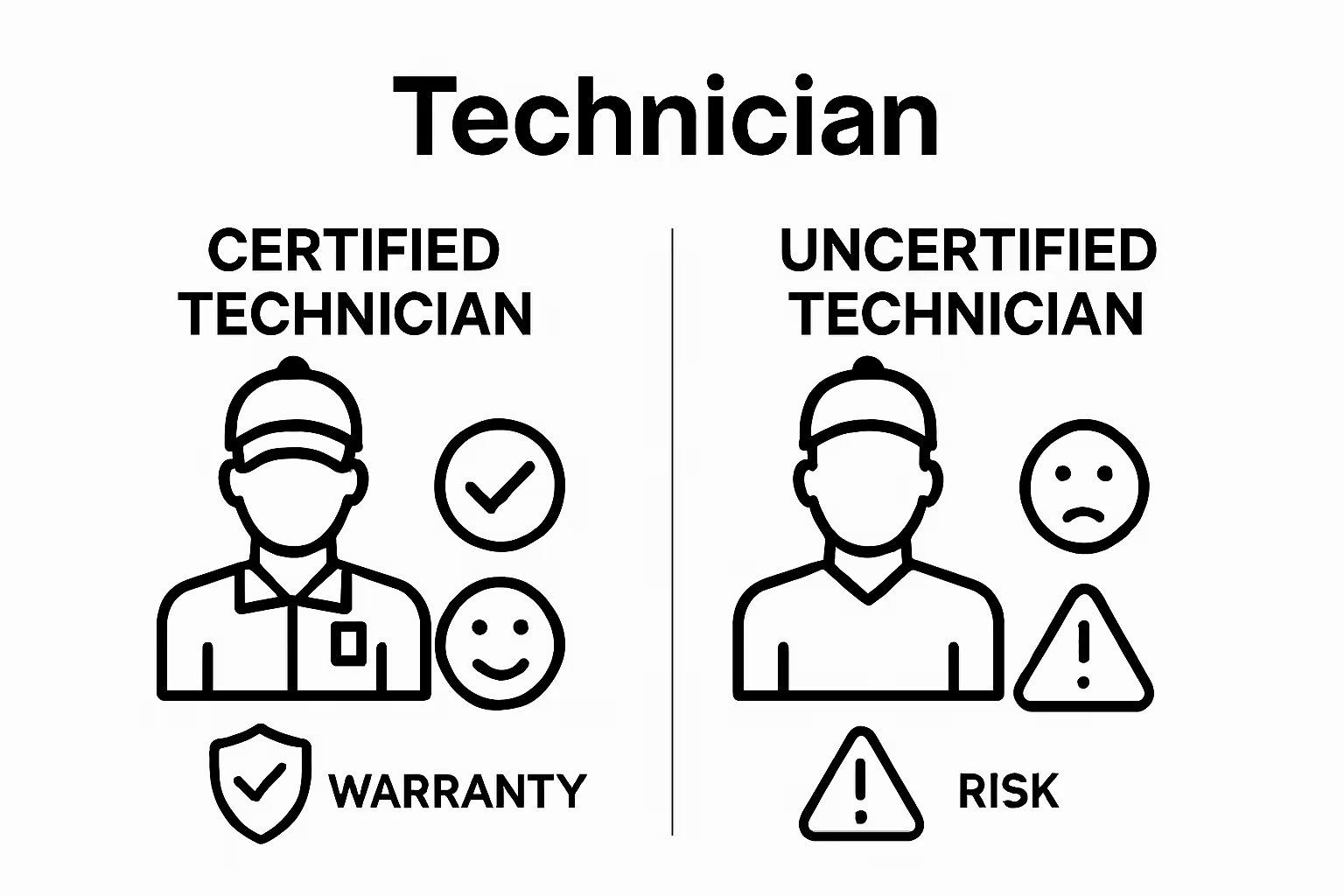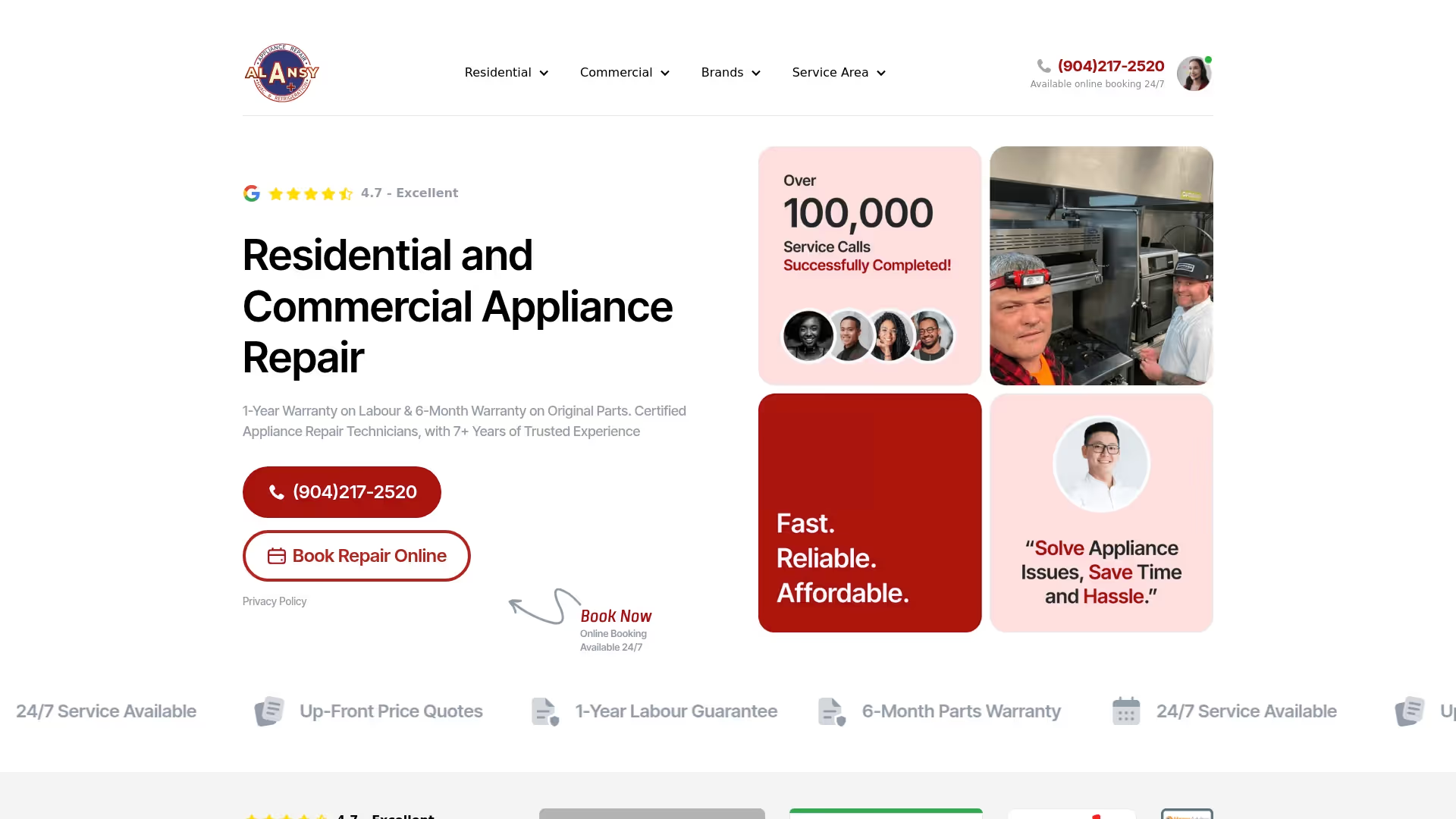Understanding Why Appliance Repair Needs Certification
Hiring someone to fix your fridge or washer might seem simple and routine. Yet studies show that uncertified repair jobs can lead to costly damages and even safety hazards for homeowners. Here is the surprise. The real value of a certified appliance technician goes far beyond getting your appliance to run again. It is the difference between protecting your home and taking a risky gamble every time you call for help.
The Importance of Certification in Appliance Repair
Certification in appliance repair transforms a basic technical skill into a professional qualification that protects both technicians and consumers. Professional certification demonstrates comprehensive knowledge, technical proficiency, and commitment to quality service in the complex world of modern appliance maintenance.
Understanding Professional Standards
Professional certification establishes rigorous standards that go beyond basic mechanical skills. Authorized service providers receive specialized training that ensures they understand intricate technical requirements for different appliance models and brands. This training covers critical areas like:
Certified technicians undergo comprehensive assessments that validate their expertise across multiple appliance types, from refrigerators and washing machines to complex integrated home systems. These evaluations confirm their ability to diagnose, repair, and maintain sophisticated equipment efficiently and safely.
Safety and Consumer Protection
Certification serves as a critical safeguard for consumers by ensuring that technicians meet established professional standards. According to the National Appliance Service Technician Certification (NASTeC), certified professionals demonstrate measurable competence in handling complex repair scenarios. This certification protects homeowners by reducing risks associated with improper repairs, which could lead to electrical hazards, equipment damage, or potential personal injury.
Moreover, certified technicians understand manufacturer warranties and repair protocols, which helps maintain the integrity of expensive home appliances. Read more about our professional repair services that prioritize safety, expertise, and consumer trust.
By investing in professional certification, appliance repair technicians signal their commitment to continuous learning, technical excellence, and customer satisfaction.
To help clarify the distinctions between certified and uncertified appliance repair technicians, the following table summarizes the key differences in professional standards, consumer protection, and potential risks.
AspectCertified TechnicianUncertified TechnicianProfessional StandardsMeets industry certification requirements and ongoing educationMay lack standardized training or formal credentialsSafety ProtocolsFollows established safety and manufacturer-recommended guidelinesMay not follow or be aware of important safety protocolsQuality AssuranceUndergoes regular skill assessments and quality controlNo external verification of skills or service qualityConsumer ProtectionProvides warranty maintenance and reduces liability risksCan void warranties and increase risk of damage or injuryLegal ComplianceOperates within regulatory and legal frameworksExposed to fines, legal penalties, and business interruptionsCustomer TrustBuilds credibility and confidence for clientsFaces skepticism and may lose business due to perceived risk

Understanding the Standards and Requirements for Certification
Certification in appliance repair is not a uniform process but a structured system with specific standards and requirements designed to ensure professional competence and consumer safety. These standards protect both technicians and homeowners by establishing clear benchmarks for technical knowledge and practical skills.
Regulatory and Professional Certification Frameworks
According to the U.S. Environmental Protection Agency, certification involves rigorous assessment across multiple dimensions. Professional certification frameworks typically encompass several key components:
These frameworks ensure that certified technicians possess not just mechanical skills, but a holistic understanding of appliance systems, safety regulations, and emerging technological trends.
This table outlines the core components of major certification frameworks and demonstrates how each ensures technicians meet professional expectations in both knowledge and job performance.
Certification ComponentDescriptionConsumer BenefitWritten ExaminationTests theoretical understanding of appliance systems, regulations, and safetyEnsures technician is knowledgeable and up-to-datePractical Skills AssessmentEvaluates repair techniques and diagnostic abilities hands-onIncreases likelihood of correct, efficient repairsOngoing EducationRequires continued learning to maintain certificationKeeps technician current with new technologiesSafety & Environmental ProtocolsMandates compliance with safety standards and environmental lawsReduces risk of accidents and environmental harmManufacturer-Specific TrainingCovers repair procedures for various appliance brandsPreserves warranty and equipment longevity
Technical Knowledge and Skill Verification
Certification requirements go beyond basic technical competence. Technicians must demonstrate advanced problem-solving skills and comprehensive understanding of diverse appliance technologies. The certification process typically involves:
Explore our professional repair approach that meets the highest industry certification standards. Professional certification represents a commitment to excellence, ensuring that appliance repair technicians are equipped with the most current knowledge and most sophisticated repair techniques available in the industry.
By establishing and maintaining these rigorous standards, certification programs protect consumers, elevate professional capabilities, and drive continuous improvement in appliance repair services.
How Certification Affects Quality and Safety in Repairs
Certification plays a critical role in establishing and maintaining high-quality standards for appliance repair services. By creating structured evaluation processes, certification ensures that technicians possess the necessary skills, knowledge, and commitment to deliver safe and reliable repair solutions.
Quality Control Mechanisms
Research from quality management studies demonstrates that certification introduces robust quality control mechanisms that significantly improve service outcomes. Certified technicians undergo comprehensive assessments that evaluate their ability to:
These quality control mechanisms transform appliance repair from a basic mechanical task into a professional service with standardized performance expectations. Certification ensures that technicians can handle increasingly sophisticated home appliances with precision and expertise.
Safety and Risk Mitigation
Certification directly impacts consumer safety by establishing strict protocols that minimize potential risks during repair procedures. Certified technicians understand critical safety considerations such as electrical hazards, refrigerant handling, and potential equipment malfunctions. They are trained to:
Learn more about our professional repair standards that prioritize safety and quality. Certification transforms appliance repair from a potentially risky service into a structured, professional intervention that protects both the equipment and the homeowner.
By implementing comprehensive certification requirements, the appliance repair industry creates a framework that continuously elevates technical competence, ensures consumer protection, and maintains the highest standards of professional service delivery.
The Role of Certification in Building Trust with Customers
Certification serves as a powerful mechanism for establishing credibility and transparency in the appliance repair industry. It transforms customer perceptions from uncertainty to confidence by providing tangible proof of a technician’s professional competence and commitment to excellence.
Validating Professional Expertise
According to the U.S. Bureau of Labor Statistics, certification acts as a critical credential that communicates a technician’s validated skills and professional standing. This validation occurs through several key mechanisms:
Customers increasingly seek reassurance that their expensive home appliances will be handled by professionals who understand complex technological systems. Certification provides this reassurance by establishing a clear, objective standard of professional competence that goes beyond mere claims of expertise.
Transparency and Customer Confidence
Certification creates a transparent framework that helps customers make informed decisions about repair services. Professional credentials communicate reliability and trustworthiness more effectively than marketing claims or verbal assurances. By choosing a certified technician, customers benefit from:
Discover our commitment to professional standards that prioritize customer trust and service excellence. Certification represents more than just a document it symbolizes a technician’s dedication to delivering high-quality, reliable repair services that meet and exceed customer expectations.
Ultimately, certification bridges the gap between customer uncertainty and professional confidence, creating a foundation of trust that is essential in the modern appliance repair landscape.
Navigating the Consequences of Operating Without Certification
Operating as an appliance repair technician without proper certification carries significant legal, financial, and professional risks. These consequences extend far beyond simple regulatory compliance and can fundamentally undermine a technician’s ability to provide reliable, trustworthy service.

Legal and Regulatory Implications
According to the U.S. Environmental Protection Agency, operating without required certifications can result in substantial legal penalties. Uncertified technicians face potential consequences that include:
Regulatory frameworks mandate certification as a fundamental requirement for protecting consumer safety and maintaining professional standards. These regulations are designed to ensure that technicians possess the necessary skills and knowledge to handle complex appliance repair tasks safely and effectively.
Professional and Financial Repercussions
Beyond legal consequences, operating without certification creates profound professional challenges. Uncertified technicians encounter substantial barriers that can permanently damage their career prospects:
Learn about our professional certification standards that protect both technicians and consumers. Certification is not merely a bureaucratic requirement but a critical safeguard that demonstrates professional commitment and competence.
The risks associated with operating without certification far outweigh any perceived short-term advantages. Technicians who bypass professional certification compromise their professional integrity, expose themselves to significant financial and legal risks, and ultimately undermine the trust essential to successful appliance repair services.
Choose Certified Appliance Repair That Protects Your Investment
Do you worry about the risks of hiring someone without proper appliance repair certification? The article explains how uncertified repairs can lead to safety hazards, voided warranties, and costly repeat problems. At AlanSY, every repair is performed by technicians who meet all professional certification standards. You get transparent proof of our expertise and a commitment to safety you can trust.

Make sure your appliances receive repairs that follow the latest industry protocols for both commercial and residential needs. Visit our certified appliance repair services to see our dedication to quality firsthand. Take the next step toward reliable appliance care by connecting with a team that guarantees both professional skill and peace of mind. Get service from someone who is proven qualified, not just someone willing to take the job. Act now to protect your home or business with certified repair from Alansy LLC.
Frequently Asked Questions
Why is certification important for appliance repair technicians?
Certification is crucial as it establishes a technician’s knowledge, skills, and adherence to professional standards, ensuring safe and effective repairs while protecting both technicians and consumers.
What does the certification process involve for appliance repair technicians?
The certification process typically includes comprehensive written examinations, practical skills assessments, ongoing education, and adherence to safety protocols, validating technicians’ technical competencies.
How does certification enhance consumer safety in appliance repairs?
Certification minimizes risks associated with improper repairs by ensuring technicians understand safety protocols, manufacturer guidelines, and complex repair procedures, which helps prevent accidents and damages.
What are the consequences of operating an appliance repair business without certification?
Operating without certification can lead to legal penalties, loss of customer trust, financial repercussions, and potential liability for damages, compromising professional credibility and service quality.


